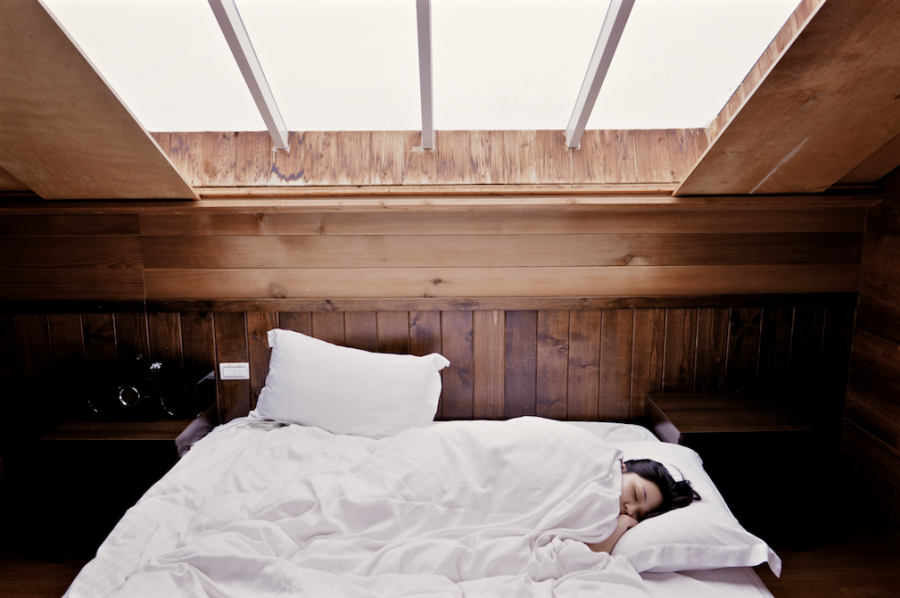Tips to Getting Your Best Night’s Sleep
March 13, 2017
College students are notorious for being creatures of the night. Whether it’s staying up late to study for a midterm or going out to a party, we always find ourselves with a distinct lack of sleep and many find it hard to get a good rest. If you are one of those finding it hard to fall asleep at night, here are a few tips that can help you fall asleep while making your night more restful.
1. Get Enough Sleep in the First Place
Finding the right amount of sleep can be difficult. Everyone is different when it comes to proper amounts of sleep and sometimes it takes some experimenting to figure out what’s good for your health.
The National Sleep Foundation recommends for those ages 18 to 64, that getting around seven to nine hours of sleep is the most beneficial to your health.
So, the first thing you can do is, of course, make sure you go to sleep on time. Not only will you be able to wake up on time, but you will be more rested and ready for the day ahead.
2. Try Melatonin
While there are many over the counter sleep aids out there, most of them contain chemicals not naturally occurring in the human body that can mess with your sleep cycle in the long run and only help you short term.
Melatonin is a naturally occurring chemical in your body that helps to make you sleepy. It’s available over the counter in the U.S. usually in a pill form that is chewable or can be swallowed. Adding more melatonin to your system can help you get to sleep faster if you’re having a hard time falling asleep.
3. Find the Perfect Pillow
There are so many different types of pillows to choose from. Whether it’s the original Feather down pillow, A fancy memory foam pillow that keeps itself cool, or a pillow that pretends to be your boyfriend. Finding the right kind of pillow is very important to getting a good night’s sleep. Everybody has different pillow preferences, so it’s helpful to go to the store and try them out to figure out what’s best for you.
4. Avoid Caffeine
Now this should probably come as common sense, but I’ll repeat it for those who need some reminding, caffeine keeps you awake. You should avoid caffeinated drinks at all costs at least within five to six hours before you go to sleep. Caffeine stimulates the brain and prevents it from making those chemicals that tell you when it’s time to sleep. So, if you ever want to get to sleep, simply avoid caffeine.
5. Stay Off Electronics
You may have noticed that checking your phone while you’re in the dark in bed can make it appear very bright, straining your eyes. That is because all screens give off a blue light. This light can prevent your brain from releasing melatonin. Watching TV or checking social media before bed keeps your body from wanting to go to sleep.
The best solution to this is to avoid screens once you slip into bed. If you absolutely have to type that last minute paper while in bed, look into using a red filter like f.lux, which puts a filter over your screen to stop the blue light from keeping you awake.
6. Keep It Cool
A hot bedroom is never fun for anyone. It’s important to keep your room cool so you can sleep comfortably. Keeping your room around 60 to 67 degrees will help to keep you sleeping soundly.
7. Work Out, Pass Out
People who exercise during the day get a better sleep at night. Your muscles get fatigued and your body is more likely to tell you it’s time for a good sleep. So if you’re having a hard time going to sleep, try hitting the gym before hitting the hay.
8. Don’t Forget a Midnight Snack
Well, maybe not a midnight snack, but eating foods with both carbohydrates and protein help you fall asleep faster. Snacks like cereal with milk help release tryptophan, a chemical that makes you sleepier. Protein is what helps form tryptophan, so try having some breakfast food right before you sleep.
9. Even Out Your Schedule
Sleep debt is a commonly misunderstood practice that many believe you can make up for a lack of sleep over the weekend by sleeping more. In fact, sleeping in more over the weekend than during the weekday can mess up with your circadian rhythm and leave you more tired on Monday than you usually would be. Try and aim for the same amount of sleep every night, no matter what day it is. You’ll help to keep your natural circadian rhythm in check and feeling more rested.
10. Nap, Carefully
Napping can be a great way to get some extra energy during the day, but if you’re not careful you can end up more tired than before. Aim for either a 20 minute power nap or a 60 to 90 minute snooze if you have to. Above all, avoid napping in the afternoon, you can throw off your circadian rhythm and make it harder to fall asleep at night.
Photography by Nomao Saeki (via unsplash.com)






